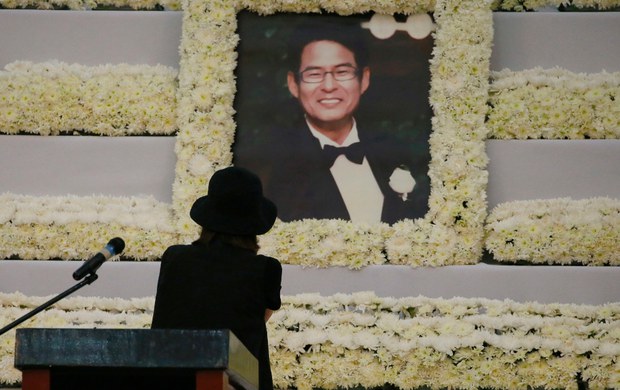Philippines: Duterte South Korea Trip Raises Concerns over Businessman's Killing
2018.06.01
Manila
 Choi Kyung-Jin, widow of Jee Ick-Joo, the South Korean businessman who was allegedly kidnapped and killed by rogue police officers, pays tribute to her late husband during a memorial service inside the Philippine National Police headquarters, Feb. 6, 2017.
Choi Kyung-Jin, widow of Jee Ick-Joo, the South Korean businessman who was allegedly kidnapped and killed by rogue police officers, pays tribute to her late husband during a memorial service inside the Philippine National Police headquarters, Feb. 6, 2017.
President Rodrigo Duterte is set to embark on a two-day official visit to Seoul next week, the government announced Friday, but the killing of a South Korean businessman in 2016 has cast a shadow over the trip.
Duterte is scheduled to travel to Seoul on Sunday at the invitation of the South Korean government, the first trip by a Philippine president in four years, Foreign Undersecretary Ernesto Abella said.
“Also, the president will be meeting with the Filipino community like he has done in previous visits,” Abella told reporters. “The majority are workers entering the country under the Employment Permit System or EPS, while the rest are students, professionals, missionaries and spouses of Korean nationals.”
He said an estimated 68,000 Filipinos are in South Korea which has had diplomatic relations with Manila since 1949.
Duterte is to meet with South Korean businessmen and is expected to invite them to invest in the Philippines, which hosted about 1.6 million South Korean tourist last year, Abella said.
South Korea had also donated about U.S. $100,000 (5.25 million pesos) to help the Philippine Red Cross in post-conflict assistance to Marawi, which ravaged when militants linked to the Islamic State (IS) attacked the city last year.
Businessman killed
Duterte’s visit comes nearly two years after a diplomatic spat erupted following the killing of South Korean businessman Jee Ick-Joo in October 2016, four months after the Filipino leader became president. The 53-year-old businessman was seized by rogue police who claimed the action was in line with its drug war.
He allegedly was strangled inside the Philippine National Police headquarters in Manila on Oct. 18, 2016, by officers who then extorted about $100,000 (5.25 million pesos) from his widow under the pretense that he was still alive. There were no drugs founds on the victim.
The officers, now in detention while facing trial on kidnapping with homicide charges, were allegedly led by an anti-narcotics agent and several others.
Jee was killed by wrapping his head in packing tape and his body was later cremated at a funeral home owned by a former police officer, according the indictments. His death was downplayed by then-national Police Chief Ronald dela Rosa who called it an isolated incident.
But rights groups said the killing became possible because rogue police were emboldened by Duterte’s promises they would not be held accountable for their actions under his internationally condemned drug war.
Asked whether Jee’s case would be discussed by the leaders when they meet, Abella said: “It’s not part of the agenda but if raised at all, it may be on a side basis. But it’s not part of the agenda.
“I’m sure he will reassure them that everything that needs to be done is being done and that we will assure them that justice will be done,” Abella said of Duterte.
New York-based Human Rights Watch (HRW) urged the South Korean government to raise the issue of Jee’s killing with Duterte, noting that irony of a recent donation of 130 vehicles made by the Seoul government to Manila police to help maintain “peace and order” in the city.
HRW noted that about 12,000 suspected drug pushers and addicts, including children, have been killed by police and pro-government vigilantes. The government’s figure is much lower – it reports officers have killed about 4,100 in the drug war.
South Korean’s envoy to Manila, Han Dong-man has neglected to note the “fact that the South Korean businessman named Jee Ick-Joo was one of those (drug war) victims and that prosecution of his alleged killers has stalled,” said Phelim Kine, HRW’s deputy director for Asia.
“On behalf of Jee Ick-Joo, South Korea should use its leverage as a major source of foreign aid and investments to the Philippines to publicly demand an end to the drug war killing killings and support efforts by the United Nations and International Criminal Court to seek accountability for those deaths,” Kine said.







